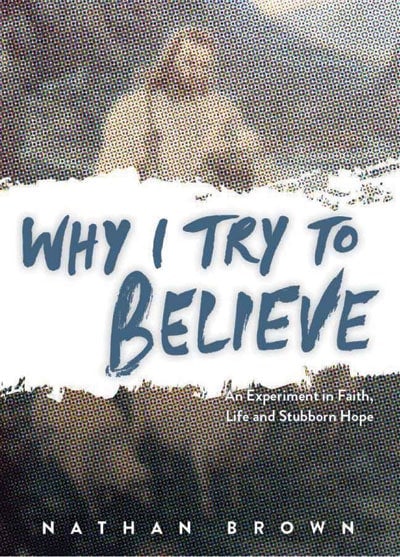
 Why I Try to Believe: An Experiment in Faith, Life, and Stubborn Hope
Why I Try to Believe: An Experiment in Faith, Life, and Stubborn HopeNathan Brown, Signs Publishing, 2015, 122 pages, US$9.99, softcover.
Christianity is under attack. And not just from late-night talk shows, atheists, and evolutionists. Christianity is in peril because of, well, some Christians.
Whenever a natural or human disaster is followed by some prominent Christian leader blaming the event on God’s judgment against the sins of this or that group, the public (as well as many Christians) are tempted to roll their eyes and think, Do you really believe that? Is that what God is about?
In his latest book Nathan Brown takes readers on his journey to preserve his faith, as well as identify an intelligent faith.
He writes: “In both positive and negative ways, the experiences of life make our beliefs vulnerable to questions and transformations.” And who of us, in moments of quiet reflection, haven’t questioned God’s way in the world, and certainly our response to it?
In 10 short chapters, and with remarkable candor, Brown shares some of his questions, and reveals how his study of the Bible, and counsel from friends, helped answer them. Why I Try to Believe is not dogmatic, but it does provide answers, Brown’s answers. With a series of thought questions for each chapter, he gives readers permission to come up with their own answers—something Christ encouraged with His questions to followers when He was on earth.
As society and situations become more challenging and complicated, we may have to admit that some of the answers from generations ago no longer satisfy today’s believers. Why I Try to Believe helps give voice to those questions and provides answers.
Stephen Chavez is an assistant editor of Adventist Review.
 The Heart of the Matter
The Heart of the MatterCD Review
When Christian musicians walk the fine balance between honesty about the human struggle and faith in God, they have accomplished a great feat. This is the case with Alison Brook’s latest CD, The Heart of the Matter. One can sense the artist’s authentic walk with Jesus in every pulse, chord, and lyric.
From the plaintive tones of the title track, Brook jumps into her most confrontational voice for the soulful “Tell Him How You Feel.” “Listen” breaks hearts again, as does “Wanderer,” which features one of the album’s two brilliant spoken word interludes by guest artist Lee G. “Someone Save Me” feels like a trip to the catacombs of despair, but breaks into daylight with some of Brook’s strongest, most ringing vocals. “What Might Have Been” visits the darkness again, finishing with a heart-rending appeal to make peace with God. Anyone who hears it will know why the pristine “Stars” won second place in the Inspire Songwriting Contest (www.visitinspire.org/article/241/news/inspire-2015-songwriting-contest/2015-songwriting-contest-awards) and why “The Sparrow Song” holds audiences spellbound with the dulcet sweetness of Alison’s soprano range.
Inviting guest writer and singer Laura Whidden (http://www.laurawhiddenmusic.com) on “Rest With Me Now,” Brook celebrates the true meaning of the Sabbath. Finally, the exhilarating “Lily,” using a finely woven wall of impeccable harmony, draws yet another metaphor from the natural world. Brook brings us back down to the core issue in her tender delivery of “Revelation Song” from The Lamb Wins—the only cover on the album (www.thelambwins.com).
Get this CD! Download it or buy it from alisonbrook.com. Hear the range and power of this songbird’s voice, sonically and poetically speaking, or your life will remain incomplete. Don’t miss this opportunity to enjoy the creative gift of a young believer. Don’t miss The Heart of the Matter.
Jennifer Jill Schwirzer is a singer/songwriter, author, and professional counselor who resides in Philadelphia with her husband, Michael, and their dog, Fred. She is justly proud of daughter Alison’s accomplishments.
 Exodus: Gods and Kings
Exodus: Gods and Kings(2014) Available on DVD— Rated PG-13, violence
Big movie Bible story telling can be grandly impacting and tantalizingly imaginative. It can also be sadly disappointing.
Cecil B. DeMille’s 1956 epic, The Ten Commandments, started at the beginning of Moses’ life and tracked him through to his earthly end on Mount Nebo. By contrast, Exodus: Gods and Kings starts in the middle and promptly strays from the biblical version. Moses’ Hebrew identity being exposed, he is promptly banished. Wandering through the desert, he finds Jethro’s kindness and a beautiful Zipporah—this much is accurate—and settles into what he expects will be a quiet life.
Then God appears to him, through a burning bush and the absurdity of a mudslide, and speaks to him—even more absurdly—in the form of a surly little boy. Moses’ reluctant return to Egypt heralds Israel’s liberation, all naturalistically explained, including a Red Sea parting through tornadoes and a tsunami. At the film’s anticlimactic end an aging Moses is bound for Canaan, a place we know he will not see, and the credits roll.
Apart from the kind man Moses finds and the beautiful woman he marries, there is little there that reflects biblical history. But would you know it without knowing your Bible? Biblical history is gritty, exciting, traumatizing, and exhilarating. The best purpose this movie substitution could serve is to expose the difference between its lack and the emotional, psychological, and spiritual power of the real thing. In that context, if you really want this type of undertaking to work for you, Exodus: Gods and Kings may serve as a teaching tool that spurs you to get back to the Word of God, which is where we all need to be.
Wilona Karimabadi is an assistant editor of Adventist Review and editor of KidsView.